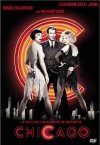BUY THE DVD:
|


|
|
|
SYNOPSIS:
| |
murderesses velma kelly and roxie hart strive for fame at any costs including scandal and lies in 1920s chicago.
|
|
|
MOVIE FACT:
| |
john travolta, kevin spacey, and hugh jackman were all considered for the role of billy flynn.
|
|
|
RATING:
|


two out of four possible stars
|
|
|
|
The musical sequences are expertly done. The set decorations are intricate and visually stunning. The costumes are beautiful. And the frenetic pace doesn't let up until after the credits start to roll. But the soul of Chicago is lost in an overblown production where the music is a lot more interesting than the characters themselves. The stories of Renée Zellweger's murdering chorus girl wannabe, "Roxie Hart," and Catherine Zeta-Jones's "Velma Kelly" just don't have any depth.
Though they both look beautiful in their costumes, and each shows some talent on the dance floor, their characters begin and end on the same note. Velma and Roxie are both scheming 1920's flappers who will do anything, including engage in unjustified murder, to achieve their goals. And after they are incarcerated for their crimes, and await their trials, neither woman repents her sins or tries to turn into a less reprehensible person. If anything, each grows more evil as the story progresses. And whether the audience will truly care whether either of these women swings from the gallows or not is questionable.
The only thing which might keep people waiting to find out what happens to the characters is the anticipation of the next musical number. The creators of the original Broadway production of "Chicago," Bob Fosse and Fred Ebb, are responsible for the already existing songs for this film, and there is nothing to criticize about their efforts. In fact, the best part of the film might be the songs. That element is certainly what has kept the stage musical so popular with audiences.
But a stage production is an entirely different beast than a feature film. And stage acting is completely different from performance in front of a camera as well. So one has to wonder why the creators of this film decided to make the film resemble nothing more than a filmed stage production. Since the character literally burst into song every five or so minutes, the sets often transform magically into darkened stages filled with lonely spotlights where the characters belt out a few jazz era tunes. The songs are well-written and the lyrics sound just as they should coming out of Zeta-Jones, Zellweger, and Richard Gere's mouths.
In fact, Gere, who plays the high-priced and unethical lawyer commissioned to defend the two murderesses, looks and sounds rather good during the musical numbers, and it is a welcome surprise to see him engage in a role a bit more light and fluffy than his usual dour fare. But there is not a lot of three-dimensionality to his character. He's a lawyer. And he's unethical. And that's about all the audience knows about him. The same can be said for all but one of the characters in the film. John C. Reilly, who was cruelly denied his own movie poster (as the three headlining stars received) reveals more emotion and character in his few scenes than anyone in the movie.
The three leading characters of the film shouldn't be blamed for the fact that their characters are more superficial than Reilly's, as their musical performances seem to make up for that fact most of the time. In point of fact, the most valuable aspect of this film is its performances. Many of the songs from the musical are already widely known and are in the national lexicon, and seeing the familiar lyrics recited on screen will probably please fans and make new fans of people who have never heard the musical. The energy present in all of the actors' performances (whether they have depth of character or not) matches that of fellow musical, Moulin Rouge, and accomplishes it without dizzying editing techniques.
But though the musical numbers may be entertaining, and the songs might cause a large portion of the audience to go pick up the soundtrack for the film, it's too hard to say whether people outside of the "art house" cinema circuit will be interested in this film. And whether they will like it or not. Because for all the slick and polish of the production, it still fits much more neatly into a "niche" picture than did Moulin Rouge. Getting an audience for a musical is hard on any day, but when the musical resembles exactly what one might see at the theater (the stage kind, not the screen kind), achieving that chore seems doubly hard.
When all is said and done, Chicago can be considered light entertainment that might bypass a wide audience, but will probably please a select few very much. Like the era it portrays, the sensational jazz and nonsense of 1920's comes to life in a beautiful hyper-reality that showcases the expertly written songs and heavily sequined costumes to the hilt. An "A" for effort would describe this movie very accurately, even if the finished product isn't that much of an emotional experience. While the songs of Chicago might loop around in your brain for a few days after seeing the film, the characters don't make as much of an impact. Good performances are had by all, but the souls of Velma, Roxie, Billy, Amos, and Mama (played by the voluptuous Queen Latifah), are missing. Bottom line: Chicago has a lot of life, but not a lot of heart.
Review by Kelsey Wyatt.
| |
|